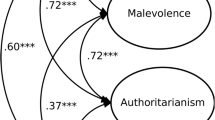Abstract
The Community Mental Health Ideology (CMHI) Scale, an abridged version of Rokeach's Dogmatism (D) Scale, and the five-item form of the Political-Economic Conservatism (PEC) Scale were administered to 140 members of the Massachusetts Citizen Mental Health Area Boards. The results indicate that degree of adherence to community mental health ideology as measured by the CMHI Scale is significantly negatively correlated with dogmatism and political-economic conservatism. The sample of nonprofessional citizens scored higher on the CMHI Scale than did groups of mental health professionals who had been previously studied. They also obtained scores on the D Scale and PEC Scale indicating that these lay members of mental health area boards are less dogmatic and less conservative than the groups with which these scales were originally developed.
Similar content being viewed by others
References
Adorno, T. W.; Frenkel-Brunswick, Else; Levinson, D. J.; and Sanford, R. N.The authoritarian personality. New York: Harper, 1950.
Baker, F., and Schulberg, H. The development of a community mental health ideology scale.Community Mental Health Journal, 1967,3, 216–225.
Baker, F., and Schulberg, H. The community mental health ideology patterns of staff members at a changing mental hospital. (Mimeo.) December, 1968.
Gilbert, Doris C., and Levinson, D. J. “Custodialism” and “Humanism” in staff ideology. In Greenblatt, M.; Levinson, D. J.; and Williams, R. H. (Eds.),The patient and the mental hospital. Glencoe, Ill.: The Free Press, 1957. Pp. 20–36.
Hollingshead, A., and Redlich, F.Social Class and Mental Illness. New York: John Wiley, 1958.
Rokeach, M.The open and closed mind. New York: Basic Books, 1960.
Schulberg, H., and Baker, F. Varied attitudes toward community mental health.Archives of General Psychiatry, 1967, 17, 658–663.
Sharaf, M. R., and Levinson, D. J. Patterns of ideology and role differentiation among psychiatrist residents. In Greenblatt, M.; Levinson, D. J.; and Williams, R. H. (Eds.)The patient and the mental hospital. Glencoe, Ill.: The Free Press, 1957. Pp. 263–285.
Strauss, A.Psychiatric ideologies and institutions. New York: The Free Press of Glencoe, 1964.
Troldahl, V. C., and Powell, F. A. A short-form dogmatism scale for use in field studies.Social Forces, 1965, 44, 211–214.
Vacchiano, R. B.; Strauss, P. S.; and Schiffman, D. C. Personality correlates of dogmatism.Journal of Consulting and Clinical Psychology, 1968, 32, 83–85.
Author information
Authors and Affiliations
Additional information
Dr. Schulberg is associated with United Community Services, Boston. The study reported in this paper was supported by NIMH Special Grant MH-09214.
Rights and permissions
About this article
Cite this article
Baker, F., Schulberg, H.C. Community Mental Health Ideology, Dogmatism, and Political-Economic Conservatism. Community Ment Health J 5, 433–436 (1969). https://doi.org/10.1007/BF01420028
Issue Date:
DOI: https://doi.org/10.1007/BF01420028




